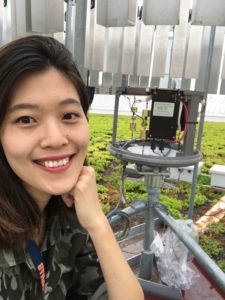Yige Yang, a PhD student in Civil & Environmental Engineering, is in the “Spotlight” this month. Thanks to Yige for contributing to the second installment of this series!

Yige, what inspired you to become an engineer?
I am from an “engineering” family: my parents are electrical engineers, my uncle and aunt are civil engineers, and my grandparents are mechanical engineers. It is like a tradition in this kind of family to become an engineer. In addition, my hobby is doing DIY [do-it-yourself] and I make all kinds of interior decorations. I think the reason why I enjoy doing these projects is that I like to make my ideas become real. It is what engineers do! It is a fascinating process to sharpen your ideas, struggle with all kinds of challenges, and then see the final accomplishment. Last, but not least, I love Mother Earth, so I want to protect the environment. All of these reasons are why I became an environmental engineer.
What skills and knowledge have been of key importance to your success in graduate school?
Team work, planning ahead, and the ability to learn are keys to success in graduate school. Especially in an engineering major, we have all kinds of projects to finish each semester. It is very important to communicate with your team members efficiently to finish the project on time and get a high score.
In addition, having a planner is very helpful. I make a to-do list every morning during breakfast, listing items in order of importance. In graduate school, I take classes and do research. Sometimes I have five meetings a day and having a planner helps me schedule my time ahead and not miss any small things.
Furthermore, figure out the best way for you to learn. I learned R and MATLAB by myself. There are thousands of videos and resources online. When I realized I prefer to spend my time learning the software intensely rather than take a course in the whole semester, I did it online. Now they are crucial to making progress of my research.
Do you have any mentors who have helped guide you? What is some pivotal advice that they have given you?
Cliff Davidson is my mentor at Syracuse University. The field of sustainability captured my interest right after I took CIE 600 “Intro to Sustainability,” which was taught by him. After that class, I joined his research group. Cliff is not only my advisor of research, but also a mentor of communication. He is always very modest, even though he has so much knowledge. At conferences, he is always the most serious person, sitting in the front row and taking notes, even though he may be the wisest person in the room. He rarely gives me advice, but I learned so many life lessons from his actions.
What advice would you give new graduate students?
- Figure out what your research interest is. It is very hard but the most important thing.
- Always have your hobby other than research, so you can relax and enjoy life.
- Speak out loud your own thoughts: never expect people know what you are thinking. Don’t bury all of your brilliant ideas!
About Yige:
Yige Yang graduated from Sun Yat-sen University, China, in 2013 with a major in environmental science and a minor in public relations. During her undergraduate studies, she participated in a variety of research experiences: she explored detoxification of metal ions by microbial siderophore, and assessed water quality of Loe Pool at Plymouth University, UK. Being the Vice President of Student Association, she organized and planned all variety of student events.
Yige enrolled in the Department of Civil & Environmental Engineering at Syracuse University in Fall 2013 as a Master’s student. She continued to the PhD program after completion of her master’s degree. She is active in the Chinese Students and Scholars Association (CSSA) at SU, where she designs and manages light control for all CSSA-sponsored events. She is also a member of orange pulse dance troupe. She has received the Water Fellowship and earned several other awards.
Her current research includes understanding the hydraulic and thermal performance of green roofs and the specific design of green roofs.